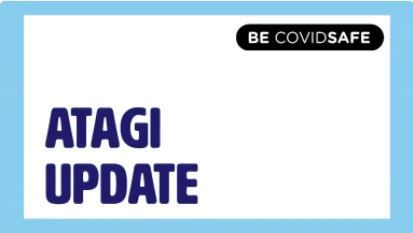
ATAGI met on Wednesday 4 August 2021 to review the latest developments relating to adverse events observed following immunisation with COVID-19 vaccines, including AstraZeneca COVID-19 vaccine and Thrombosis and Thrombocytopenia Syndrome (TTS), cases in Australia. In addition, ATAGI continues to monitor COVID-19 epidemiology in Australia including current COVID-19 outbreaks involving the Delta variant, including in New South Wales and Queensland.
AstraZeneca COVID-19 vaccine
Thrombosis and Thrombocytopenia Syndrome (TTS)
ATAGI considered an update from the Therapeutic Goods Administration (TGA) on current confirmed cases of TTS and those under investigation. The latest TGA statement on TTS cases, including clinical outcomes, can be found on the TGA website.
ATAGI examined estimates of risk of TTS by age group in Australia and note that there have been 93 cases of confirmed or probable TTS (57 confirmed cases; 36 probable cases). To date around 6.8 million doses of COVID-19 Vaccine AstraZeneca have been administered. ATAGI sadly noted a further death has been reported by the TGA this week.
International data continues to demonstrate the risk of TTS following a second dose of COVID-19 Vaccine AstraZeneca is much lower than the risk following a first dose (estimated internationally to be 1.9 per million second doses). ATAGI reinforced the importance of completing a two-dose schedule with the same brand to ensure maximal protection.
However, noting that all rates of TTS cases are based on first doses of COVID-19 Vaccine AstraZeneca to 21 July 2021 (to account for the time to onset), as of 21 July 2021 approximately 6.0 million doses of COVID-19 Vaccine AstraZeneca have been administered, made up of around 4.7 million first doses and 1.3 million second doses.
Although estimates of risk based on small numbers of cases are imprecise, the risk of TTS is estimated in Australia at around:
- 2.7 per 100,000 in those
- 1.7 per 100,000 in those ≥60 years.
A breakdown of current rates by decade of age for those aged ≥ 50 years is included in the table below.
Age bracket (years) | Estimated rate (per 100,000 AZ vaccinations) |
3.4 | |
50-59 | 2.4 |
60-69 | 1.5 |
70-79 | 2.0 |
≥80 | 1.6 |
ATAGI also noted that the TGA has reviewed Australia’s confirmed and probable TTS cases and those reported by overseas regulators using the CDC Criteria, which uses the following categories:
- Tier 1: criteria are defined as clots in an unusual location such as the brain or abdomen and a low platelet count with or without a positive test for antibodies that activate platelets (anti-PF4 antibodies);
- Tier 2: criteria are defined as only clots found in more usual locations such as the legs or lungs with a low platelet count and a positive test for anti-PF4 antibodies.
When considering Australian TTS cases in using the CDC Criteria, ATAGI noted in the Australian context:
- 38 confirmed and probable TTS cases met the CDC Tier 1 definitions, 19 of which occurred in those younger than 60 years;
- 26 confirmed and probable TTS cases met the CDC Tier 2 definitions; and
- 29 confirmed and probable TTS cases do not meet either CDC Tier 1 or 2 definitions. These include cases with clots in common locations with thrombocytopenia but no evidence of anti-PF4 antibodies, including some with arterial thrombosis. Cases may be reclassified as more clinical data are received.
As previously noted, younger individuals appear to be at greater risk of severe outcomes than older people. 42 cases have occurred in men and 51 cases in women, with a higher number of severe outcomes in younger women than in younger men. No sex differences are being observed in older individuals.
ATAGI reinforces that the benefits of vaccination with COVID-19 Vaccine AstraZeneca strongly outweigh the risks of adverse effects in all Australians ≥60 years. In the context of a COVID-19 outbreak where the supply of Comirnaty (Pfizer) is constrained, ATAGI reinforces adults younger than 60 years old who do not have immediate access to Comirnaty (Pfizer) should re-assess the benefits to them and their contacts from being vaccinated with COVID-19 Vaccine AstraZeneca, versus the rare risk of a serious side effect.
ATAGI noted the following key resources on TTS and the use of the COVID 19 Vaccine AstraZeneca:
- the ATAGI/THANZ joint statement which provides information about TTS and reaffirms ATAGI’s previous advice regarding the safe use of the AstraZeneca COVID-19 Vaccine;
- the TTS primary care guide, which provides advice for providers on the consideration and management of suspected TTS cases, noting the importance of early presentation and recognition of TTS;
- the risk-benefit document, which provides advice to help consumers make informed decisions about the risks and benefits of AstraZeneca COVID-19 Vaccine in different age cohorts and scenarios; and
- additional guidance on the use of COVID-19 vaccines in outbreak settings;
- response to NSW COVID-19 outbreak; and
- additional strategies to combat the risk posed by the Delta variant of concern.
At this time, there is no update to the ATAGI statement from 17 June 2021 in relation to the use of COVID-19 Vaccine AstraZeneca, except to note that further clarification has been provided (above) in regards to its use in outbreak settings.
ATAGI continues to review and closely monitor reports of other rare but potentially serious adverse events following immunisation including: Immune Thrombocytopenia (ITP) and Guillain Barre syndrome (GBS) following COVID-19 Vaccine AstraZeneca.
Comirnaty (Pfizer)
ATAGI notes the TGA’s recent registration of Comirnaty (Pfizer) for use in children aged 12- 15 years old and has provided a recent statement on use in this cohort.
Myocarditis
ATAGI continues to review and closely monitor reports of rare but potentially serious adverse events following immunisation following Comirnaty, including myocarditis.
ATAGI notes that the TGA are investigating 28 episodes of myocarditis observed following Comirnaty (Pfizer) in Australia, most frequently following the second dose. International data demonstrates that the rate of disease is higher in younger individuals, particularly young males. Most reported cases have been mild, self-limiting and recovered quickly, although further follow-up of these cases is ongoing.
ATAGI has recently published guidance on Myocarditis and Pericarditis after mRNA COVID-19 vaccines. ATAGI reaffirms that the benefits of Comirnaty (Pfizer; currently registered for use in people aged ≥12 years in Australia) outweigh the risks of myocarditis for any age groups, and strongly recommend eligible individuals without contraindications to be offered vaccination.








